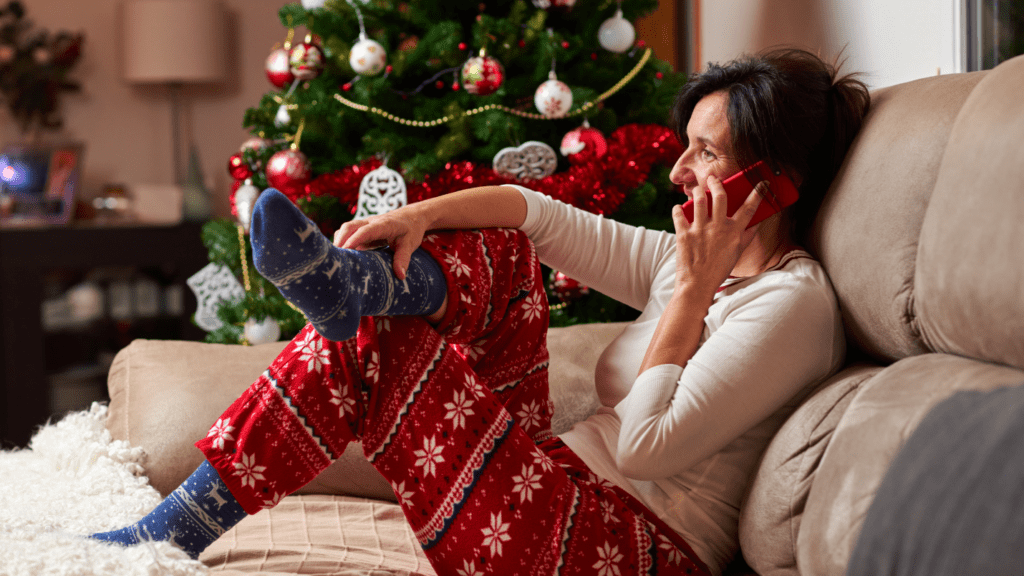During the festive season, some of us can feel very disconnected from friends and family, especially if our personal circumstances (physical capacity, finances, support available, mental health, etc) prevent us from socialising and attending end-of-year gatherings.

If we aren’t able to connect with people we love, especially around Christmas, our mental health can spiral, leading to further isolation.
Engaging in meaningful relationships can positively affect our health by lowering stress, anxiety, and depression while boosting mood and resilience, improving brain function, and delaying cognitive decline.
So when you’re not physically able to get out and about, it can feel pretty lonely.
Here’s some sage advice from our Mental Health Team on navigating this holiday season by maintaining social connections while supporting your mental and emotional wellbeing.
Keep Connections Going
When you physically cannot get out and socialise, this can impact your mental health, and you may feel like your mind is telling you to shut out the world, but be careful. (Remember all the positive benefits we’ve mentioned above about relationships).
We encourage you to double down on reaching out to friends or family. Social connections do not need to involve big parties or expensive events. If larger events feel overwhelming, try organising to catch up individually with friends and family. Call or Facetime a loved one. Send Christmas cards – doing something kind or thoughtful for others is scientifically proven to make us feel better about ourselves.
Routine. Routine. Routine.
Small goals like getting out of bed at the same time every morning and having a shower can make a big difference. Having a good routine can be very helpful when experiencing poor mental health and wanting to isolate. Incorporating time into your routine to maintain connections with family and friends can also help you feel connected throughout this time of the year.
Remember, listening to feel-good music, spending time in nature, and eating nourishing foods can all significantly improve your mental and emotional health.
Don’t suffer in silence.
Sometimes, we fear we will be ridiculed if we’re vulnerable, or we worry about burdening others with our problems, so we bottle everything up and avoid social engagements. Your struggles are real to you, and you deserve support to get through them. Tell loved ones how you’re feeling, and let them know how they can help you. Know that you don’t have to suffer in silence.
You can also contact mental health services or consider resources like Lifeline, The Mental Health Line, and Beyond Blue.
Plan Ahead
If you are able to attend a social gathering for a short period, prepare ahead by:
- Determining the venue and if any environmental adaptations are needed to ensure accessibility. This may include ensuring physical access, sensory break spaces, or accessible travel plans. Selecting a quieter venue to reduce sensory overload can also help. If travelling, you may need to plan and organise hire equipment to ensure you can safely and easily access your environments.
- Having a trusted person with you who can help you navigate challenging or overwhelming social interactions and provide you with emotional support can make things significantly easier.
- Conserve your energy levels before and after the outing with lots of rest and hydration, and prepare an exit strategy just in case you need to leave early. Having a day of rest before and after a big event can help to ensure you have lots of energy to enjoy yourself and plenty of time to recover afterwards.
At the end of the day, only prioritise social events that are meaningful to you. It’s good to socialise, but it shouldn’t be at the expense of your physical or mental health, safety or comfort.
How do you feel now?
If you recognise you’re starting to feel lonely or isolated, we encourage you to contact your clinician to make an appointment. Together, you can work on a plan to help you navigate this festive season.
And remember, the festive season is a challenging time for many. If you need emergency mental health support over the festive season, you can always access 24 hour support through:
- Lifeline: 13 11 14
- Mental Health Crisis Line: 1800 011 511
- Emergency Services: 000
For more information, call us on 1300 588 851.
Until next time,

